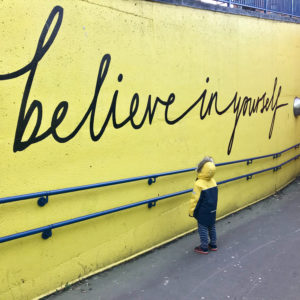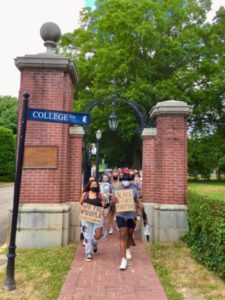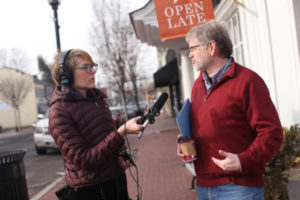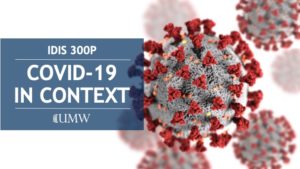Student Publication Spreads Positivity During Pandemic

Created by UMW students under the guidance of Writing Center Director Gwendolyn Hale, The Positivity Post spreads uplifting news and some much-needed cheer to the Mary Washington community. Photo by Katrina Wright on Unsplash.
Abruptly, in mid-March – as the coronavirus pandemic began its rampage – Cosette Veeder-Shave ’22 had to leave Mary Washington and return to her home in New York. She could no longer physically be with her professors or her classmates; she just saw tiny images of them on her computer screen as she continued her courses online.
Meanwhile, sickness and death surrounded her. “So many of my family and friends were in the hospital,” she said. “I felt so helpless.”
So, she turned – virtually, of course – to three of her fellow staffers at UMW’s Writing Center who also were experiencing anxiety and discouragement. One of them, Piper Giannini ’21, suggested they do something to “bring smiles to people’s faces, even if short-term.”
The Positivity Post was born. The first issue came out April 13, and it has faithfully landed in 100-plus subscribers’ inboxes each Monday since then. This weekly dose of glass-half-fullness is distributed as a Google document that lacks high-tech touches but brims with heartfelt material.
Each edition features an uplifting photograph, a day-brightening story (a recent one was about customizing creative face masks) and news from around Mary Washington in a section called “Kindred Eagles.” There’s at least one highlighted pet, a faculty profile and “POGOs,” described by The Positivity Post as “Positive Gossip – messages that members of the UMW community send [anonymously] to others to show appreciation or recognition.” Read more.
March and Resolution Demonstrate Mary Washington’s Stance

Several hundred University of Mary Washington students, faculty and staff marched from Campus Walk to Market Square in Fredericksburg last week in support of racial equality and Black Lives Matter. Photo courtesy of Dean of Student Life Cedric Rucker.
Eight minutes and 46 seconds.
After walking from the University of Mary Washington campus to downtown Fredericksburg’s Market Square, a contingent of several hundred UMW protesters became silent as march organizer Kyree Ford ’21 set the timer on his iPhone. He directed the marchers to quietly observe the length of time a Minneapolis police officer held his knee on George Floyd’s neck, ultimately terminating his life.
Unimaginable, is the way Ford, incoming president of the UMW Student Government Association (SGA), described it. The UMW Board of Visitors, in a meeting yesterday, shared that sentiment in a resolution stating that on May 25 “for eight minutes and forty-six seconds an officer knelt on Mr. Floyd’s neck, as Mr. Floyd called out for his life saying, ‘I can’t breathe.’”
Further, stated the Board resolution, “around the world people from all nationalities, ethnic and racial backgrounds, and walks of life have assembled to protest, march and rally to mourn Mr. Floyd’s death and express their outrage with the social injustice of systemic racism that has led to the deaths of George Perry Floyd, Ahmaud Arbery, Breonna Taylor, Eric Garner, Michael Brown and so many more.”
The resolution, which passed unanimously, resolved that the Board supports the family of George Floyd and “stands with the thousands in our country and around the world, including members of the Mary Washington community, who have engaged in peaceful protests to affirm that Black Lives Matter, and to call for an end to the social injustice and systemic racism that permeates the fabric of our country.”
Ford said he and the SGA Cabinet “felt moved to do something during this very difficult time.” How crazy, he said, that in the midst of a deadly pandemic, “we have to go out and fight for our lives.”
Last Friday’s hastily organized march drew students, faculty, staff and administrators, many carrying signs. President Troy Paino and his family joined in. Ford said he was overwhelmed by the turnout. What that level of participation, even in a time of social distancing, says to him is: “Mary Washington is on the right side in terms of race relations.”
The Board resolution reinforced that sense for Ford. Also impressive, he added, is the step taken by President Paino and his wife Kelly to initiate with a $5,000 challenge gift a scholarship in memory of George Floyd. The scholarship, which has a goal of $100,000, is designed to promote the development of leadership skills for students committed to addressing societal issues disproportionately affecting black and underrepresented communities.
Ford said the SGA has called upon various campus groups to create a video and will plan other events later in the summer and after students arrive on campus. “We want to reaffirm that everyone has a place at Mary Washington.”
Vice President of Student Affairs Juliette Landphair, who participated in the march, praised the activism and initiative of the SGA. “It was a powerful reflection of our community values and the energy of our students.” She added, “As Dr. James Farmer once expressed, ‘freedom and equality are inherent rights in the United States; therefore, I encourage young people to take on the task by standing up and speaking out on behalf of people denied those rights.’”
Hanna’s Journal Article Wins ‘Public Memory’ Award

UMW Professor of Geography Steve Hanna, seen here during a 2018 interview for ‘With Good Reason’ radio, was the lead author on a journal article that won the prestigious Zumkehr Prize for Scholarship in Public Memory. Hanna’s research involves ‘narrative mapping’ applied at Southern plantation museums to determine how the South tells its story about slavery. Photo by Karen Pearlman.
As visitors to Southern plantation homes know, the information they receive depends on docents and the questions they’re asked, and by where on the site the group is congregated. In the parlor, for instance, tour-takers might hear about the residents’ family history and the placement of furniture. Outside, they will likely learn more about crops and, perhaps, the lives of enslaved people who labored in the fields.
The process of capturing and interpreting these variations is called “narrative mapping,” said UMW Geography Professor Stephen Hanna, whose research with colleagues at other universities aims to determine – and eventually change – how the South tells its story of slavery.
Hanna and his co-researchers applied the process to 170 tours at 15 different plantation museums. The results from two of those antebellum sites, Louisiana’s Laura Plantation and Virginia’s Berkeley Plantation, formed an article, published in the Journal of Heritage Tourism that won the prestigious Zumkehr Prize for Scholarship in Public Memory.
The honor would not have been possible, Hanna said, without years’ worth of help from Mary Washington students.
“They contributed their ideas, hard work and energy to the project” from 2014 to 2017, said Hanna, who served as the article’s lead author and who, as the team’s only cartographer, designed the method for graphically presenting the results. “My work with the students has become my favorite memories of my time at UMW.” Read more.
UMW Opens ‘COVID-19 in Context’ Course to Community
Those who think they’ve heard everything that can be said about COVID-19 can guess again.

UMW faculty will share their perspectives on the COVID-19 pandemic in a free eight-week online summer course open to incoming and current students, faculty, alumni, staff and the broader community.
Experts at the University of Mary Washington are sharing their perspectives through COVID-19 in Context, an eight-week online summer course starting June 1 that will be open free of charge to not only UMW students, faculty, alumni and staff, but also the broader community. The 16 classes will be delivered right to cell phones, tablets and computers via Zoom. All participants need is Internet access.
Each session will look at the coronavirus pandemic from a different angle – the effect on climate change, the history of pandemics, the potential impact on our upcoming presidential election, the chemistry of disinfectants, and even how COVID-19 has influenced the fine and performing arts.
Each Monday and Wednesday through July 22, at 4 p.m., faculty from varied disciplines across the University, from psychology and communication to geography and economics, will broadcast a 30-minute lecture followed by an interactive Q&A session. The inaugural class, on June 1, will be a biologist’s look at the virus itself. Read more.